Format
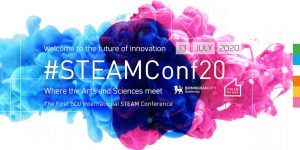
First BCU International STEAM Conference
STEAMhouse, Birmingham City University (UK)
Aimed at all those curious about cross-disciplinary thinking, researchers, innovators, industrial leaders, artists, scientists, technologists, engineers, mathematicians and those not bounded by their sectors, joined the First BCU International STEAM Conference in July 2020.
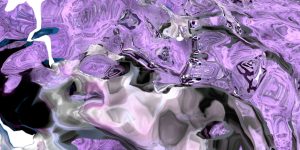
sound:frame & Pausanio virtual – Area for Virtual Art
sound:frame / Eva Fischer (AT), Marijn Bril (NL), Angie Pohl (AT)
sound:frame together with Pausanio presents the Area for Virtual Art – an online platform for digital art and virtual formats. Discover current artistic approaches in virtual exhibitions and meet people in discussion programs and live events to exchange thoughts and create new ideas and concepts. The Area for Virtual Art develops into an international hub, giving a platform to current digital art forms and connecting people all over the world.

STARTS Prize Forum: Andrea Ling
Andrea Ling (CA)
Andrea Ling, Gewinnerin des diesjährigen Grand Prize für Artistic Exploration (künstlerische Erforschung), stellt ihr Siegerprojekt Design by Decay, Decay by Design vor, eine Reihe von Artefakten, die gestalteten Verfall zeigen, entwickelt für die Ginkgo Bioworks Creative Residency 2019. Sie stellt vor, wie man eine Welt ohne Verschwendung gestalten kann und spricht über ihren künstlerischen und kreativen Prozess.
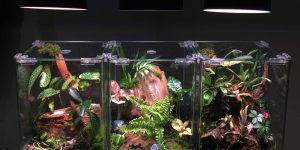
STARTS Prize Forum: Olga Kisseleva
Olga Kisseleva (RU)
Olga Kisseleva (RU), Gewinnerin des diesjährigen Grand Prize für innovative Zusammenarbeit, und Andrea Ling (CA), Gewinnerin des Grand Prize für künstlerische Erforschung, geben Einblick in ihre Praxis.
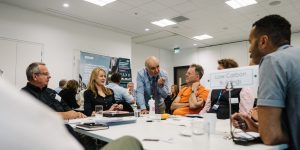
STEAMhouse: Make to Innovate
Clayton Shaw (UK), James Hannam (UK)
In this presentation from the First BCU International STEAM Conference you will learn about STEAMhouse, BCU’s centre for collaborative innovation, through an introductory talk from Programme Manager Clayton Shaw and Prototyping & Operations Manager James Hannam.
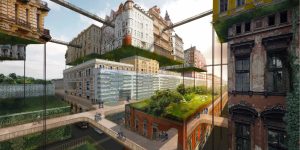
Art Thinking Forum: Humanizing Technology
Mara Balestrini (IT), Olga Kisseleva (RU), Alexander Mankowsky (DE), Hideaki Ogawa (JP/AT)
Art Thinking ist eine Diskussionsplattform zur künftigen Rolle der Kunst im Kontext von Industrie, Gesellschaft und Ökologie. Das Forum wird vom innovativen Kommunikationsdesign-Unternehmen Hakuhodo unterstützt. Zusammen mit dem Interesse der Ars Electronica an neuen Technologien und deren Auswirkungen auf die Gesellschaft ergänzt ihr zukunftsweisender kreativer Ansatz das Thema des Panels: die Zukunft der Kunst und wie innovative und kreative künstlerische Beispiele zur Humanisierung der Technologie und zur Verbesserung der Gesellschaft genutzt werden können.
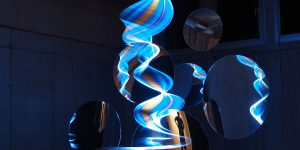
Art Thinking as Catalyst
Jurij Krpan (SI), Alejandro Martín (ES), Camille Baker (UK), Veronika Liebl (AT)
Art Thinking umschreibt die Idee, dass künstlerische Ansätze und kreatives Denken angewandt werden können, um Strategien zur Lösung realer gesellschaftlicher Herausforderungen zu entwickeln. Vier ExpertInnen auf diesem Gebiet tauschen ihre unterschiedlichen Perspektiven aus und beleuchten das Potenzial des künstlerischen Denkens, einen anderen Zugang zu Ideenfindungs- und Innovationsprozessen zu fördern.
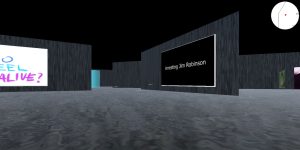
Virtual students’ exhibition “Hopes & Slopes”
VDA PhAMA (Department of Photography and Media Art at Vilnius Academy of Arts)
Made during the most intensive quarantine period works by artists from the youngest generation rethink isolation, solitude, remoteness, trauma and translate them into visual and aural vibes. All these artists are studying Animation or Photography and Media Art (PhAMA) at Vilnius Academy of Arts. - An exhibition by a group of young artists titled Hopes & Slopes is a place for a safe walk among what has fallen out a few months back.
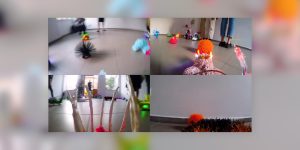
Open Studios of LTMKS/Letmekoo.lt artists
Akvilė Anglickaitė, Tomas Daukša, Saulius Leonavičius, Tomas Martišauskis, Emilija Škarnulytė and others
Artists of Lithuanian Interdisciplinary Artists’ Association open up their working studios and invite to explore contexts of heterotopias, technological mythologies, structured commonism, hybridised beings.
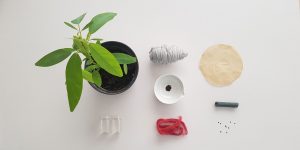
Rethinking alive as material
Rūta Spelskytė (LT)
The toolkit is designed to rethink alive as material. To think of the ways we can use nature, create tools out of it, imagine or train plant and animal features, construct their development in the future, and on the other hand – how to take a moment to stop and just appreciate it.
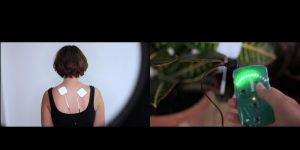
The Birth of Venus
Brigita Kasperaitė (DE/LT)
While in the past electroconvulsive therapy was used in very questionable ways, we can admit one thing, the reality is questionable in itself. And while the artist Brigita Kasperaitė explores the natural and synthetic ways of electrical discharges and how they might affect the surroundings, she is also interested in knowing and experiencing that electricity is everywhere - as well as our bodies.
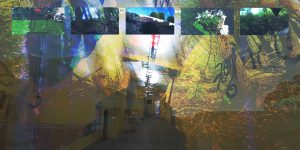
Multi-eyed creature navigating and traversing the grove
PhAMA/ FAMM department at Vilnius Academy of Arts (LT)
AE Garden Vilnius Mozilla Hub hosts directed multiangle and XR Live Experience of the Garden where around 10 live events and usual grove life are happening in numerous spaces inside and outside and dozen cameras are directed by humans, animals and plants. You can navigate through busy culture events or find your calm spot to enjoy the life of nature.
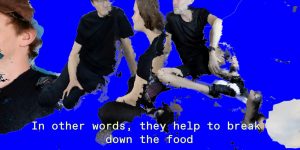
Experiencing lives
Mindaugas Gapševičius (DE/LT), Brigita Kasperaitė (DE/LT), Rūta Spelskytė (LT), Auksė Gaižauskaitė (LT)
The artist talk raises the question of collaboration between different species. It will start with a presentation of three projects: two toolkits for experimenting with living organisms and a conversation about microorganisms and their hosts. The artist talk is hosted by the Alt lab, a non-disciplinary research laboratory dedicated to artistic-scientific research and implementation of interdisciplinary projects.
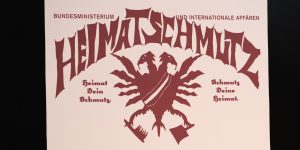
DIRTY LIVES BETTER
Barbara Ungepflegt (AT), Elsbeth Wallnöfer (IT)
Since December 2017 Barbara Ungepflegt has been Minister for Homelandtrash and International Affairs. Ungepflegt considers urgent measures to preserve the constantly disappearing homeland dirt until it is too late for Team Austria, animals and dumplings. In cooperation with Elsbeth Wallnöfer, chairwoman in the home country, the Minister will present in detail the program of DIRTY LIVES BETTER at the 2020 Ars Electronica Festival.
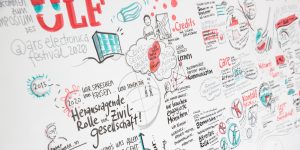
Die Zivilgesellschaft der Zukunft
Unabhängiges LandesFreiwilligen Zentrum (AT)
Wann, wenn nicht jetzt über die Zukunft der Zivilgesellschaft reden? Wie schon 2015 die Flüchtlingskrise, hat 2020 nun auch die Coronakrise die Rolle zivilgesellschaftlichen Engagements unterstrichen. Wieder einmal wurde deutlich, wie viel jene Initiativen, Vereine, NGOs, NPOs und Einzelpersonen, die wir als „Zivilgesellschaft“ betrachten, zu tun imstande sind.

Artist Talk: Sissel Marie Tonn (DK)
Artist Talk by Sissel Marie Tonn (DK) about her project ‘The Intimate Earthquake Archive’ which got the Honorary Mention in the Interactive Art + category of the Prix Ars Electronica 2020.
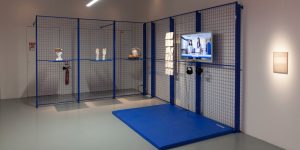
Artist Talk: Dasha Ilina (RU)
Artist Talk by Dasha Ilina (RU) about her project 'Center for Technological Pain' which got the Honorary Mention in the Interactive Art + category of the Prix Ars Electronica 2020.
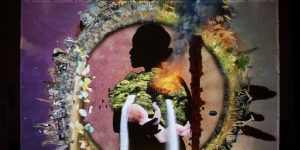
Artist Talk: Miwa Matreyek (US)
Artist Talk by Miwa Matreyek (US) about her project 'Infinitely Yours' which won the Golden Nica in the Computer Animation category of the Prix Ars Electronica 2020.
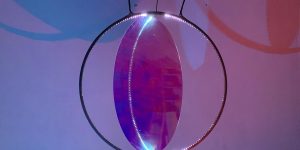
Dialogue#4 – shifting perspectives
HKU University Of The Arts Utrecht (NL)
In Dialogue#4 we talk about shifting perspectives. With several artists involved in the exhibition we discuss the aspect of “reality” and in what way art should contribute to a broader perspective on reality. Things we take for granted are maybe not what they seem, or at least there is another way of looking at them. When looking at it this way then there is no fake news as it is just another perception of reality. In a world fixed on maintaining certainty, and thus one perspective as the truth, how can artists fight against this narrow minded view on reality?

Dialogue#3 – demystifying technology
HKU University Of The Arts Utrecht (NL)
Dialogue#3 is about demystifying technology. Technology is often a black box. We have no clue what is inside the equipment we use every day. In some cases, there is even no way to open the tools we use so frequently. In what ways can we hack the technology we encounter and use every day and all day and can we give a new or different use and meaning to it? What do we learn from this process and about the way things are made and maybe should be made?


